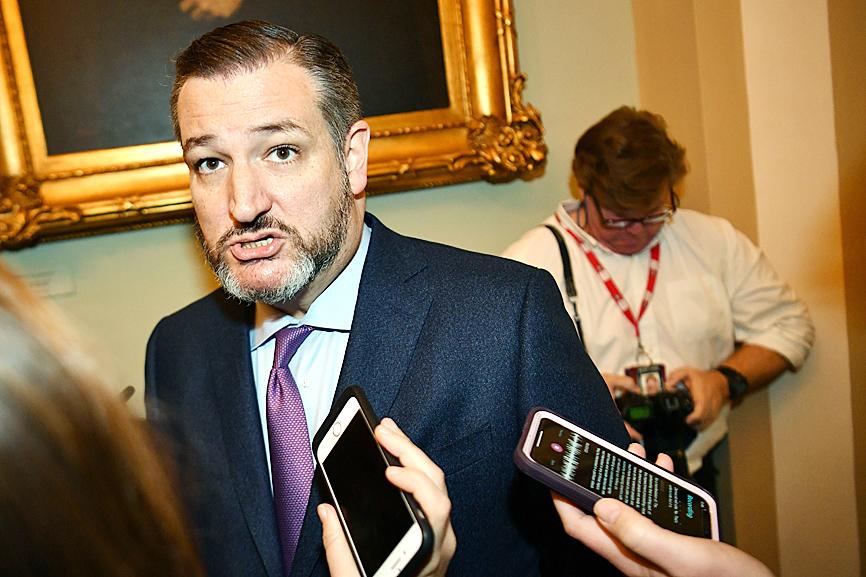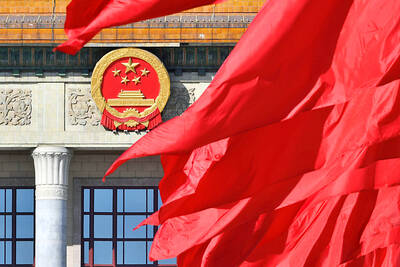China yesterday announced sanctions against US officials, including senators Marco Rubio and Ted Cruz, in a largely symbolic attempt to retaliate over Washington’s moves to punish Beijing for its treatment of ethnic minorities in the Xinjiang region.
Chinese Ministry of Foreign Affairs spokesperson Hua Chunying (華春瑩) said sanctions against the four officials would begin yesterday, without elaborating.
Hua listed Rubio and Cruz — both Republicans and high-profile critics of China — as targets of the measures, in addition to US Ambassador for Religious Freedom Sam Brownback, US Representative Chris Smith and the Congressional-Executive Commission on China.

Photo: AFP
“Xinjiang is China’s internal affairs and the US has no right to interfere,” Hua said at a regular briefing in Beijing. “We urge the US to immediately withdraw its wrong decisions, stop interfering in China’s internal affairs or undermining China’s interests. We will make further reactions based on the development of the situation.”
The move comes after the US sanctioned a top member of the Chinese Communist Party (CCP) and three other officials over alleged human rights abuses in Xinjiang.
The individuals sanctioned by the US include Xinjiang Uighur Autonomous Region CCP Secretary Chen Quanguo (陳全國), a member of the CCP’s 25-member politburo; CCP Secretary of the Xinjiang Political and Legal Committee Zhu Hailun (朱海侖); Xinjiang Public Security Bureau Director Wang Mingshan (王明山); and Huo Liujun (霍留軍), a former top official in Xiinjiang’s police force.
The tit-for-tat exchanges appeared calibrated to keep the disputes from further escalating and disrupting other aspects of ties between the world’s two largest economies, such as their “phase one” trade deal.
The US moves were largely symbolic, since both groups of US and Chinese officials were unlikely to have much financial or legal exposure to each other’s countries.
“This is an equivalent action targeting the main people responsible for what happened with sanctioning Chinese officials over Xinjiang,” said Bo Zhengyuan, partner at Beijing-based research firm Plenum. “The move gives the US a sense of how China will react when potential sanctions related to the Hong Kong Autonomy Act [HKAA] is announced. Beijing has shown that it will hit back with proportional actions, which is worrisome as the HKAA includes sanctions on entities such as financial institutions.”
The list of US officials targeted by China notably included no US officials as senior as Chen.
Rubio introduced the Senate version of US legislation calling for sanctions against Xinjiang officials, one of several measures critical of China that Cruz has also supported.
The commission, a frequent target of criticism from Beijing, had earlier this year issued a report saying the country was using forced labor as part of an official policy to suppress and control its ethnic minorities.
Hua yesterday also dismissed a tweet reposted by the US embassy in Beijing, including an image suggesting Chinese labor abuses in Xinjiang.
“We oppose they use such inferior lies to smear and attack China,” Hua said. “It shows some American people have no bottom line in attacking China.”
Additional reporting by staff writer

US PUBLICATION: The results indicated a change in attitude after a 2023 survey showed 55 percent supported full-scale war to achieve unification, the report said More than half of Chinese were against the use of force to unify with Taiwan under any circumstances, a survey conducted by the Atlanta, Georgia-based Carter Center and Emory University found. The survey results, which were released on Wednesday in a report titled “Sovereignty, Security, & US-China Relations: Chinese Public Opinion,” showed that 55.1 percent of respondents agreed or somewhat agreed that “the Taiwan problem should not be resolved using force under any circumstances,” while 24.5 percent “strongly” or “somewhat” disagreed with the statement. The results indicated a change in attitude after a survey published in “Assessing Public Support for (Non)Peaceful Unification

The CIA has a message for Chinese government officials worried about their place in Chinese President Xi Jinping’s (習近平) government: Come work with us. The agency released two Mandarin-language videos on social media on Thursday inviting disgruntled officials to contact the CIA. The recruitment videos posted on YouTube and X racked up more than 5 million views combined in their first day. The outreach comes as CIA Director John Ratcliffe has vowed to boost the agency’s use of intelligence from human sources and its focus on China, which has recently targeted US officials with its own espionage operations. The videos are “aimed at

‘MISGUIDED EDICT’: Two US representatives warned that Somalia’s passport move could result in severe retaliatory consequences and urged it to reverse its decision Minister of Foreign Affairs Lin Chia-lung (林佳龍) has ordered that a special project be launched to counter China’s “legal warfare” distorting UN Resolution 2758, a foreign affairs official said yesterday. Somalia’s Civil Aviation Authority on Wednesday cited UN Resolution 2758 and Mogadishu’s compliance with the “one China” principle as it banned people from entering or transiting in the African nation using Taiwanese passports or other Taiwanese travel documents. The International Air Transport Association’s system shows that Taiwanese passport holders cannot enter Somalia or transit there. The Ministry of Foreign Affairs (MOFA) protested the move and warned Taiwanese against traveling to Somalia or Somaliland

SECURITY: Grassroots civil servants would only need to disclose their travel, while those who have access to classified information would be subject to stricter regulations The government is considering requiring legislators and elected officials to obtain prior approval before traveling to China to prevent Chinese infiltration, an official familiar with national security said yesterday. President William Lai (賴清德) in March announced 17 measures to counter China’s growing infiltration efforts, including requiring all civil servants to make trips to China more transparent so they can be held publicly accountable. The official said that the government is considering amending the Act Governing Relations Between the People of the Taiwan Area and Mainland Area (臺灣地區與大陸地區人民關係條例) to require all civil servants to follow strict regulations before traveling to China.